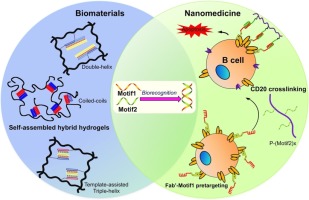Biomaterials ( IF 12.8 ) Pub Date : 2018-10-12 , DOI: 10.1016/j.biomaterials.2018.10.007 Jiyuan Yang , Lian Li , Jindřich Kopeček

|
This review highlights a new paradigm in macromolecular nanomedicine – drug-free macromolecular therapeutics (DFMT). The effectiveness of the new system is based on biorecognition events without the participation of low molecular weight drugs. Apoptosis of cells can be initiated by the biorecognition of complementary peptide/oligonucleotide motifs at the cell surface resulting in the crosslinking of slowly internalizing receptors. B-cell CD20 receptors and Non-Hodgkin lymphoma (NHL) were chosen as the first target. Exposing cells to a conjugate of one motif with a targeting ligand decorates the cells with this motif. Further exposure of decorated cells to a macromolecule (synthetic polymer or human serum albumin) containing multiple copies of the complementary motif as grafts results in receptor crosslinking and apoptosis induction in vitro and in vivo. The review focuses on recent developments and explores the mechanism of action of DFMT. The altered molecular signaling pathways demonstrated the great potential of DFMT to overcome rituximab resistance resulting from either down-regulation of CD20 or “shaving” of rituximab/CD20 complexes. The suitability of this approach for the treatment of blood borne cancers is confirmed. In addition, the widespread applicability of DFMT as a new concept in macromolecular therapeutics for numerous diseases is exposed.
中文翻译:

生物识别:无药物大分子疗法的关键
这篇综述着重介绍了大分子纳米医学的新范例–无药物大分子疗法(DFMT)。新系统的有效性基于生物识别事件,而没有低分子量药物的参与。细胞的凋亡可以通过对细胞表面互补肽/寡核苷酸基序的生物识别来引发,从而导致缓慢内在化的受体发生交联。B细胞CD20受体和非霍奇金淋巴瘤(NHL)被选为第一个靶标。将细胞暴露于具有靶向配体的一个基序的缀合物可修饰具有该基序的细胞。将修饰细胞进一步暴露于含有多拷贝互补基序的大分子(合成聚合物或人血清白蛋白)作为移植物,导致受体交联和诱导细胞凋亡体外和体内。这篇综述着重于最近的发展,并探讨了DFMT的作用机制。改变的分子信号传导途径证明了DFMT克服由CD20的下调或利妥昔单抗/ CD20复合物的“剃须”导致的利妥昔单抗耐药的巨大潜力。证实了这种方法对治疗血源性癌症的适用性。另外,暴露了DFMT作为大分子疗法用于许多疾病的新概念的广泛应用。











































 京公网安备 11010802027423号
京公网安备 11010802027423号